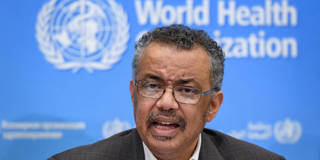A torrent of misinformation threatens to undermine efforts to adopt a legally binding Pandemic Accord. The World Health Organization’s member states must rebut the lies and rely on a pragmatic give-and-take approach in the final negotiations to ensure that the world is better prepared for the next infectious-disease emergency.
EDINBURGH – The COVID-19 pandemic taught us several lessons, many of which came at great cost. Chief among them was that, despite years of rehearsals, the world was not prepared for a fast-moving outbreak of a novel infectious disease.
Countries failed their own citizens, but the global response was even more inadequate. It was marked by an inexcusable absence of cooperation and coordination, ugly nationalism that included vaccine hoarding, and greed on the part of Western countries, which refused to share information, pathogens, and therapeutics. I would say that the response was – to use a word that may seem old-fashioned and out of favor in some quarters – sinful.
The overwhelming lesson we learned the hard way is that no one is safe anywhere until everyone is safe everywhere. Could the wave of infections caused by the second Omicron variant have been avoided if the Global South had been vaccinated more quickly? We cannot be sure. But we do know that international cooperation is not compatible with nationalism, xenophobia, and new forms of colonialism. We need a form of globalization that works for everyone, because while our world may be deeply fractured, we are all still inescapably interdependent.

EDINBURGH – The COVID-19 pandemic taught us several lessons, many of which came at great cost. Chief among them was that, despite years of rehearsals, the world was not prepared for a fast-moving outbreak of a novel infectious disease.
Countries failed their own citizens, but the global response was even more inadequate. It was marked by an inexcusable absence of cooperation and coordination, ugly nationalism that included vaccine hoarding, and greed on the part of Western countries, which refused to share information, pathogens, and therapeutics. I would say that the response was – to use a word that may seem old-fashioned and out of favor in some quarters – sinful.
The overwhelming lesson we learned the hard way is that no one is safe anywhere until everyone is safe everywhere. Could the wave of infections caused by the second Omicron variant have been avoided if the Global South had been vaccinated more quickly? We cannot be sure. But we do know that international cooperation is not compatible with nationalism, xenophobia, and new forms of colonialism. We need a form of globalization that works for everyone, because while our world may be deeply fractured, we are all still inescapably interdependent.